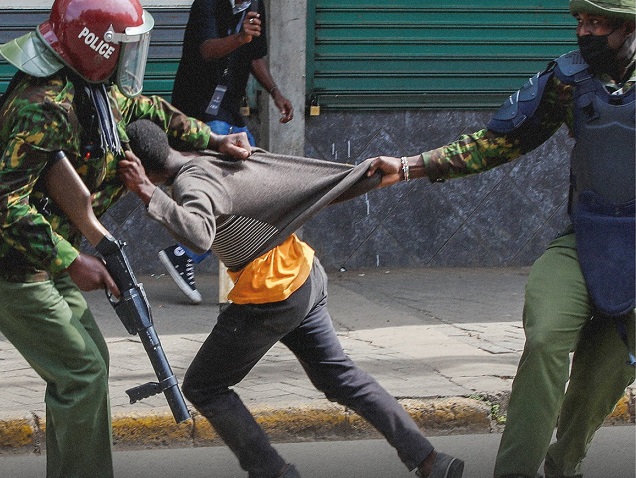Summary:
- Violent protests erupted across Kenya, leading to at least two deaths, as anti-government demonstrations continued for the third week. Despite President William Ruto withdrawing proposed tax measures, unrest persisted with blocked roads, looted shops, and clashes in Nairobi. Protesters demand government reforms and accountability, while criminal elements exploit the chaos. The Kenya National Commission on Human Rights reported 41 deaths and 361 injuries. Global leaders call for restraint and dialogue to resolve the escalating political crisis.
Violent protests erupted across Kenya on Tuesday, resulting in at least two deaths, as anti-government demonstrators continued their rallies for the third consecutive week.
The unrest persisted despite President William Ruto’s withdrawal of the proposed tax measures on June 26, which had initially sparked the protests.
The protests on Tuesday were marked by blocked roads, looted shops, burnt vehicles, shootouts, burning tires and muggings. In Nairobi, the capital, businesses shuttered, transportation came to a standstill, and residents avoided the central business district (CBD), where hundreds of youths clashed with police in running battles.
Let Us Build Your Online Success!
We are the experts in creating visually stunning and functional websites. With reliable hosting and exceptional customer support, we bring your vision to life. Join hundreds of happy clients who trust us!
Get Started Now📞 Call/WhatsApp: +256 207 800 192
“These are not the protests I had anticipated. I thought everything would be peaceful except for occasional running battles with the police, but today there was violence and theft everywhere,” said Lewis Kimeu, a young protester who had participated in previous protests.
Criminals have hijacked the protests to rob, loot and vandalize property, Kimeu said, noting that demonstrators took to the streets to demand reforms from the government, including the dismissal of officials accused of corruption. Protesters also called for government apologies and compensation for the families of those killed during the clashes with police and security forces.
Immaculate, another youthful protester, said she had intended to join peaceful demonstrations but was dismayed by the violence and theft. “We now have to protect ourselves first from these thugs. We cannot carry on with the protests,” she said.
Inside the CBD, chaos ensued as police clashed with protesters chanting anti-government slogans while also struggling to apprehend looters targeting businesses. Confrontations broke out between thugs, protesters and business owners defending their shops.
Protesters blocked most roads leading in and out of Nairobi with stones and burning tires. The Mombasa-Nairobi Road, a crucial transit route for goods from the port of Mombasa to the hinterland and neighboring countries, was blocked at Mlolongo, about 20 km from Nairobi’s CBD, leaving commuters and motorists stranded. Similar scenes unfolded on Thika Road and Waiyaki Way, with protesters barricading the roads and clashing with police who used tear gas to try to disperse them.
In Kitengela, a suburb south of Nairobi, protesters looted businesses, including entertainment spots, as they outnumbered the police.
“Our criminal investigations teams have been dispatched to pursue gang members recorded by concerned citizens violently robbing innocent Kenyans on the roads while taking advantage of the ongoing demonstrations,” the Directorate of Criminal Investigations said in a statement. “Anyone involved in criminal activities is reminded that the law will catch up with them.”
Ruto’s withdrawal of the tax measures outlined in the Finance Bill 2024, which aimed to raise an additional 346.7 billion shillings (around 2.7 billion U.S. dollars) to fund the budget of 31 billion dollars for the 2024/2025 financial year, failed to quell public unrest. Despite his call for dialogue, the demonstrations have turned violent, increasing political tension and disrupting normal business in East Africa’s largest economy.
“Following the passage of the bill, the country witnessed protests and destruction of constitutional institutions. Listening keenly to the people of Kenya, who have said loudly that they want nothing to do with this Finance Bill 2024, I concede and therefore I will not sign it and it shall subsequently be withdrawn,” Ruto said.
The Kenya National Commission on Human Rights (KNCHR) reported on Monday that at least 39 people had died in nationwide protests, a number that rose to 41 by Tuesday, with 361 others injured. “The commission notes that protests that had started as peaceful have turned chaotic, resulting in several deaths and destruction of property,” said KNCHR Chairperson Roseline Odede.
Protests also occurred in other towns, including Kisii and Kisumu in western Kenya, Mombasa on the coast, and Eldoret in the Rift Valley.
Several global leaders have urged restraint to prevent further escalation of the political crisis. United Nations Human Rights Commissioner Volker Turk expressed sadness over the protests and called for “restraint to facilitate the rights to peaceful assembly and expression, and dialogue to listen to the voices of young people.”
African Union Commission Chairperson Moussa Faki Mahamat appealed to national stakeholders to engage in constructive dialogue and address the contentious issues. ■

